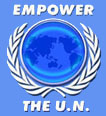 |
United Nations News | World News | World News - Africa | World News - South America Upcoming Events | People's Assembly Movement | Links / Resources | Peace, Culture & Education Articles | Women & Youth | Actions and Organizations | What People are Saying A project of Citizens for a United Nations People's Assembly - Contact |
|
Advocates Urge Creation of New UN Assembly to Tackle Crises The United Nations should create a new
parliamentary assembly to give people from all corners of the
world a bigger say in global affairs, hundreds of politicians,
academics and business leaders are urging in a written appeal.
The campaigners, who include four Nobel Peace Prize winners and
377 parliament members from 70 countries, argue that changing
the UN structure could better tackle emerging crises such as
global warming. The Independent By Anne Penketh, Diplomatic Editor Published: 23 April 2007 Some 541 politicians, academics and business leaders from Europe and around the world have signed an appeal for the creation of a UN parliamentary assembly to overcome the "democratic deficit" in global affairs and give citizens a bigger voice. One of the main objectives of the campaigners - including Dame Anita Roddick, founder of the Body Shop; Arthur C Clarke, author of 2001: Space Odyssey, four Nobel Prize winners and 377 MPs from 70 countries - is to provide a global citizens' platform to bring about change on issues such as global warming. The campaign, which is launched today and has a secretariat based in Germany,will be rolled out across the world in the next three weeks. The Israeli peace campaigner Shimri Zameret said the idea followed the successful creation of the International Criminal Court. "We were thinking: what is the next step in developing international democracy?" he said. The support of the MPs including 20 from the UK and 48 MEPs, was enlisted for what organisers hope will eventually lead to a "world parliament" at the UN, an idea certain to be opposed, however, by the American hosts of the United Nations. Only nine Americans have signed the appeal and Mr Zameret said the appeal did not have a US branch because of the lack of support in America for the world body. "The world is different since the fall of the Berlin Wall," he said. "On Iraq, Afghanistan and Palestine, it is time to hear the voice of the people in global affairs and not just the national governments." He added: "On global warming, it has become obvious that without some sort of global democracy, it will be impossible to solve this problem." The official presentations start tomorrow in the Tanzanian capital Dar es Salaam. Events will follow in Berlin, Berne, Brussels, Buenos Aires, Dhaka, London, Madrid, Mumbai, Ottawa, Rome and Vancouver. As an "indispensable" first step, it is envisaged that a consultative UN parliamentary assembly, attended by representatives of national parliaments, is set up. The former UN secretary general Boutros Boutros-Ghali is to be patron of a conference in October. Mr Boutros-Ghali, one of the appeal's signatories, said: "A Parliamentary Assembly would make the UN more transparent, more efficient and more democratic." The appeal recommends "a gradual implementation of democratic participation and representation on the global level". Over time, the assembly should be vested with "genuine rights of information, participation and control" and could eventually be composed of directly elected members. Thus, it could evolve into a world parliament, something which Mr Zameret admits "might not happen for a hundred years". The document, drawn up by a coalition of non-government organisations, notably says: "Humanity faces the task of ensuring the survival and well-being of future generations as well as the preservation of the natural foundations of life on earth. We are convinced that in order to cope with major challenges such as social disparity, proliferation of weapons of mass destruction, the threat of terrorism or the endangerment of global ecosystems, all human beings must engage in collaborative efforts. "To ensure international co-operation, secure the acceptance and to enhance the legitimacy of the United Nations ... people must be more effectively and directly included into the activities of the United Nations and its international organisations." Independent.co.uk Online Edition: Home <http://www.independent.co.uk> |
 |
United Nations News | World News | World News - Africa | World News - South America Upcoming Events | People's Assembly Movement | Links / Resources | Peace, Culture & Education Articles | Women & Youth | Actions and Organizations | What People are Saying A project of Citizens for a United Nations People's Assembly - Contact |